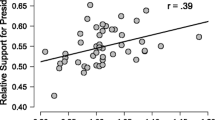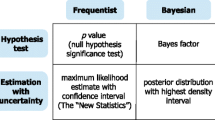Abstract
Two notions of evidence are focused on in this essay, Carnap's positive-relevance notion of evidence (1962, pp. 462 ff.), and Achinstein's notion of potential evidence (1978; and 1983, pp. 322–350). Achinstein creates several interesting examples in his attempt to find faults in Carnap's notion of evidence; his motive, ultimately, is to impel us towards potential evidence. The purpose of this essay is to show that positive relevance is significantly more promising than potential evidence with respect to capturing the scientific sense of the term “evidence.” This is accomplished by finding faults in the notion of potential evidence, and by defending positive relevance against Achinstein's examples.
Similar content being viewed by others
References
Achinstein, P., 1983, The Nature of Explanation. New York: Oxford.
Achinstein, P., 1981, ‘On Evidence: A Reply to Bar-Hillel and Margalit’, Mind 90, 108–112.
Achinstein, P., 1978, ‘Concepts of Evidence’, Mind 87, 22–45.
Bar-Hillel, M. and Margalit, A., 1979, ‘In Defense of a Classical Notion of Evidence’, Mind 88, 576–583.
Carnap, R., 1962, Logical Foundations of Probability, The University of Chicago Press.
Giere, R. N., 1970, ‘An Orthodox Statistical Resolution of the Paradox of Confirmation’, Philosophy of Science 37, 354–362.
Hempel, C. G., 1945, ‘Studies in the Logic of Confirmation’, Mind 54, 1–26, 97–121.
Jaynes, E. T., 1976, ‘Bayesian Intervals vs Confidence Intervals’, in W. Harper and C. Hooker (eds.), Foundations of Probability Theory, Statistical Inference and Statistical Theories of Science, Boston: D. Reidel Publishing Company.
Kronz, F. M., 1988, ‘EPR: The Correlations are Still a Mystery’, Philosophy of Science 55, 631–639.
Popper, K. R., 1959, The Logic of Scientific Discovery, New York: Harper and Row.
Rosenkrantz, R. D., 1973, ‘Probability Magic Unmasked’, Philosophy of Science 40, 227–233.
Salmon, W. C., 1975, ‘Confirmation and Relevance’, in G. Maxwell and R. Anderson (eds.), Induction, Probability and Confirmation, Minneapolis: University of Minnesota Press.
Author information
Authors and Affiliations
Additional information
I am especially indebted to Peter Achinstein, Edwin Allaire and Bob Kane for many valuable suggestions. I would also like to thank my colleagues Donald Becker and Jean Kazez for their constructive criticisms and other useful suggestions. (The defense of the positive-relevance notion of evidence provided here fulfills an obligation made in an earlier essay (Kronz, 1988).)
Rights and permissions
About this article
Cite this article
Kronz, F.M. Carnap and Achinstein on evidence. Philos Stud 67, 151–167 (1992). https://doi.org/10.1007/BF00373695
Received:
Issue Date:
DOI: https://doi.org/10.1007/BF00373695




